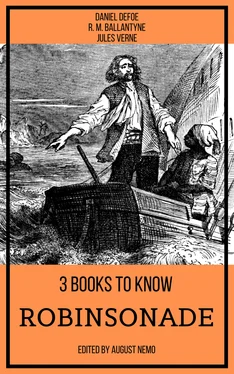THE VOYAGE — THE ISLAND, and a Consultation in which Danger is Scouted as a Thing Unworthy of Consideration — Rats and Cats — The Native Teacher — Awful Revelations — Wonderful Effects of Christianity.

OUR VOYAGE DURING THE next two weeks was most interesting and prosperous. The breeze continued generally fair, and at all times enabled us to lie our course; for being, as I have said before, clipper-built, the pirate schooner could lie very close to the wind and make little leeway. We had no difficulty now in managing our sails, for Jack was heavy and powerful, while Peterkin was active as a kitten. Still, however, we were a very insufficient crew for such a vessel; and if any one had proposed to us to make such a voyage in it before we had been forced to go through so many hardships from necessity, we would have turned away with pity from the individual making such proposal as from a madman. I pondered this a good deal, and at last concluded that men do not know how much they are capable of doing till they try, and that we should never give way to despair in any undertaking, however difficult it may seem — always supposing, however, that our cause is a good one, and that we can ask the Divine blessing on it.
Although, therefore, we could now manage our sails easily, we nevertheless found that my pulleys were of much service to us in some things, though Jack did laugh heartily at the uncouth arrangement of ropes and blocks, which had, to a sailor’s eye, a very lumbering and clumsy appearance. But I will not drag my reader through the details of this voyage. Suffice it to say that, after an agreeable sail of about three weeks, we arrived off the island of Mango, which I recognised at once from the description that the pirate Bill had given me of it during one of our conversations.
As soon as we came within sight of it, we hove the ship to and held a council of war.
“Now, boys,” said Jack as we seated ourselves beside him on the cabin skylight, “before we go further in this business we must go over the pros and cons of it; for although you have so generously consented to stick by me through thick and thin, it would be unfair did I not see that you thoroughly understand the danger of what we are about to attempt.”
“Oh, bother the danger!” cried Peterkin. “I wonder to hear you, Jack, talk of danger! When a fellow begins to talk about it, he’ll soon come to magnify it to such a degree that he’ll not be fit to face it when it comes — no more than a suckin’ baby.”
“Nay, Peterkin,” replied Jack gravely, “I won’t be jested out of it. I grant you that when we’ve once resolved to act, and have made up our minds what to do, we should think no more of danger. But before we have so resolved, it behoves us to look it straight in the face, and examine into it, and walk round it; for if we flinch at a distant view, we’re sure to run away when the danger is near. — Now, I understand from you, Ralph, that the island is inhabited by thorough-going, out-and-out cannibals, whose principal law is, ‘Might is right, and the weakest goes to the wall?’”
“Yes,” said I; “so Bill gave me to understand. He told me, however, that at the southern side of it the missionaries had obtained a footing amongst an insignificant tribe. A native teacher had been sent there by the Wesleyans, who had succeeded in persuading the chief at that part to embrace Christianity. But instead of that being of any advantage to our enterprise, it seems the very reverse; for the chief Tararo is a determined heathen, and persecutes the Christians — who are far too weak in numbers to offer any resistance — and looks with dislike upon all white men, whom he regards as propagators of the new faith.”
“’Tis a pity,” said Jack, “that the Christian tribe is so small, for we shall scarcely be safe under their protection, I fear. If Tararo takes it into his head to wish for our vessel, or to kill ourselves, he could take us from them by force. You say that the native missionary talks English?”
“So I believe.”
“Then, what I propose is this,” said Jack. “We will run round to the south side of the island, and cast anchor off the Christian village. We are too far away just now to have been descried by any of the savages, so we shall get there unobserved, and have time to arrange our plans before the heathen tribes know of our presence. But in doing this we run the risk of being captured by the ill-disposed tribes, and being very ill-used, if not — a —”
“Roasted alive and eaten!” cried Peterkin. “Come, out with it, Jack! According to your own showing, it’s well to look the danger straight in the face.”
“Well, that is the worst of it, certainly. Are you prepared, then, to take your chance of that?”
“I’ve been prepared and had my mind made up long ago,” cried Peterkin, swaggering about the deck with his hands thrust into his breeches pockets. “The fact is, Jack, I don’t believe that Tararo will be so ungrateful as to eat us, and I’m quite sure that he’ll be too happy to grant us whatever we ask; so the sooner we go in and win the better.”
Peterkin was wrong, however, in his estimate of savage gratitude, as the sequel will show.
The schooner was now put before the wind, and after making a long run to the southward, we put about and beat up for the south side of Mango, where we arrived before sunset, and hove-to off the coral reef. Here we awaited the arrival of a canoe, which immediately put off on our rounding-to. When it arrived, a mild-looking native, of apparently forty years of age, came on board, and taking off his straw hat, made us a low bow. He was clad in a respectable suit of European clothes; and the first words he uttered, as he stepped up to Jack and shook hands with him, were:
“Good-day, gentlemen. We are happy to see you at Mango. You are heartily welcome.”
After returning his salutation, Jack exclaimed, “You must be the native missionary teacher of whom I have heard — are you not?”
“I am. I have the joy to be a servant of the Lord Jesus at this station.”
“You’re the very man I want to see, then,” replied Jack; “that’s lucky. Come down to the cabin, friend, and have a glass of wine. I wish particularly to speak with you. My men there”— pointing to Peterkin and me —“will look after your people.”
“Thank you,” said the teacher as he followed Jack to the cabin; “I do not drink wine or any strong drink.”
“Oh! then there’s lots of water, and you can have biscuit.”
“Now, ‘pon my word, that’s cool!” said Peterkin; “his men, forsooth! Well, since we are to be men, we may as well come it as strong over these black chaps as we can. — Hallo, there!” he cried to the half-dozen of natives who stood upon the deck, gazing in wonder at all they saw, “here’s for you;” and he handed them a tray of broken biscuit and a can of water. Then thrusting his hands into his pockets, he walked up and down the deck with an enormous swagger, whistling vociferously.
In about half-an-hour Jack and the teacher came on deck, and the latter, bidding us a cheerful good-evening, entered his canoe and paddled to the shore. When he was gone, Peterkin stepped up to Jack, and touching his cap, said:
“Well, captain, have you any communications to make to your men?”
“Yes,” cried Jack: “ready about, mind the helm, and clew up your tongue, while I con the schooner through the passage in the reef. The teacher, who seems a first-rate fellow, says it’s quite deep, and good anchorage within the lagoon close to the shore.”
Читать дальше













